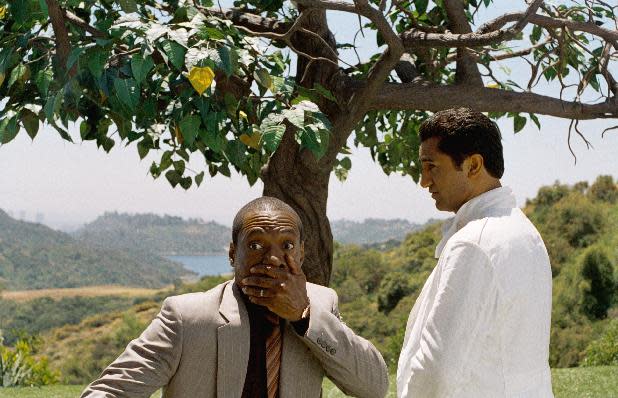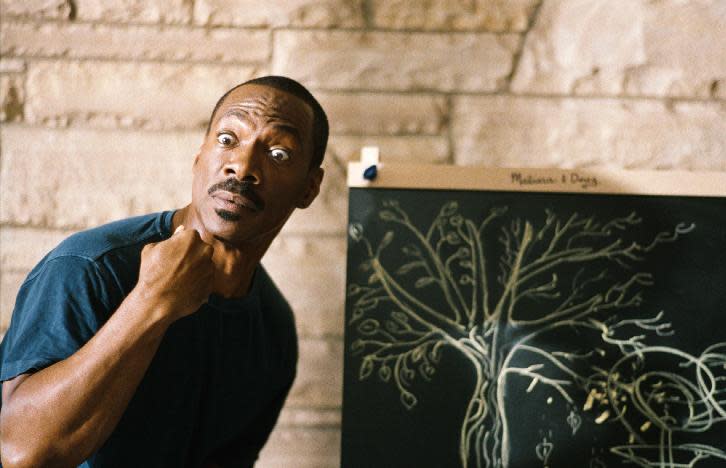Review: Murphy's 'Thousand Words' should shut up
In the opening sequence of "A Thousand Words," Eddie Murphy starts with his back to the camera then turns abruptly to reveal a strip of duct tape over his mouth.
A very good idea, if the once hip fast-talker of "Beverly Hills Cop" is going to continue using hollow, stumbling comedies such as this as his mouthpiece to the world.
The notion of taking away motor-mouth Murphy's ability to spew words sounds like a bizarre filmmaking choice until you encounter the obnoxious clown he plays here, boorish literary agent and inattentive family man Jack McCall. He's so annoying you'll be aching for the moment the action comes around to that opening image when the duct tape gets slapped over Jack's mouth. That would be so he'll hold his tongue after a bodhi tree magically appears in his backyard and begins losing leaves each time he utters a word, and he learns through a guru's mystical guesswork that when the last leaf falls, he'll die.
Oh, yeah. About that plot. What left field did this senseless story from screenwriter Steve Koren ("Jack and Jill") come out of? And why didn't Murphy, director Brian Robbins and a team of producers including Nicolas Cage weed it out before it took root in theaters that would be better used showing retrospectives of Murphy's "Nutty Professor" flicks or even his dreadful "Norbit."
"A Thousand Words," which was made in 2008 yet sat on the shelf until now, is a movie built on drivel. Murphy's Jack is a jerk, but a run-of-the-mill jerk, making the filmmakers' effort to build some sort of cosmic cautionary warning around him feel like overkill, like taking a Garden Weasel into the kitchen to toss a salad.
Here's where Jack's at as the film opens: He's the ace at his literary agency, not through sleaziness but just through rude, crude pushiness. He clearly loves his wife (Kerry Washington) and young son, but he's not good at the family thing yet and needs to man up a bit. He's got a mother (Ruby Dee) whose memory is slipping but is well-cared for at a lovely facility, where he visits her dutifully. He treats his assistant (Clark Duke) and others in his circle like personal serfs, though he's more neglectful than abusive about it.
All in all, a thoughtless loudmouth, but certainly not a terrible man.
When he tries to sign superstar self-help guru Sinja (Cliff Curtis) as a book client, he gets a few mild gibes about his lifestyle from the spiritual guide. Next thing you know, a bodhi tree from Sinja's retreat transplants itself to Jack's backyard, a leaf dropping for each word Jack utters or writes. Sinja guesstimates there are a thousand leaves left and that when the last one falls, Jack will croak.
What? Umm, OK. It apparently made sense to Murphy and the filmmakers, including Robbins, who previously directed him in "Norbit" and the flop "Meet Dave."
They strain to sow laughs out of this thin, pointless idea with dumb slapstick and pratfalls and a lot of wordless mugging by Murphy, who proves he can be just as insufferable when he's not talking as when he is. Along the way, we get simple-minded moralizing about what's important in life: family, humility, generosity, treating people with respect — all the stuff that Eddie Murphy stands for.
Dee almost brings a few moments of grace to the movie, until you remember what movie she's in, then you just feel sad she's there at all. It's equally sad to see Allison Janney wasting her presence as Jack's boss.
Jack's a guy who's not worth the universe's extreme spiritual ministrations. His story's not worth your time. And "A Thousand Words" is not worth any more dismissive words. It needs to make like a tree and leave.
"A Thousand Words," a DreamWorks film distributed by Paramount release, is rated PG-13 for sexual situations including dialogue, language and some drug related humor. Running time: 91 minutes. One and a half stars out of four.
___
Motion Picture Association of America rating definitions:
G — General audiences. All ages admitted.
PG — Parental guidance suggested. Some material may not be suitable for children.
PG-13 — Special parental guidance strongly suggested for children under 13. Some material may be inappropriate for young children.
R — Restricted. Under 17 requires accompanying parent or adult guardian.
NC-17 — No one under 17 admitted.





